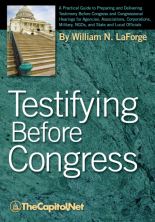From the Congressional Glossary – Including Legislative and Budget Terms
Exclusion / Disorderly Behaviour / Censure / Reprimand / Expulsion

Members of Congress are subject to disciplinary procedures in their respective chambers. The Constitution states (Article I, Section 5, cl. 2): “Each House may . . . punish its Members for disorderly Behaviour, and, with the Concurrence of two thirds, expel a Member.” Each chamber has disciplined members for violations of law and congressional rules, including ethics rules. Each has also disciplined members for actions that are not explicitly disallowed in law or rules, but that bring discredit or disrepute on the House or Senate. However, the jurisdiction of the House and Senate is over sitting members, not former members. The most serious disciplinary action that a chamber may take is expulsion, which, as the Constitution provides, requires a two-thirds vote. Each chamber has a variety of other responses to “disorderly Behaviour,” including censure, reprimand, and lesser disciplinary actions, which the chambers and their ethics committees tend to shape and name to suit the offense and the response that is desired to be made to it.
Members of Congress are not exempt from civil or criminal liability. They are subject to prosecution for violations of federal, state, and local criminal law.
An “expulsion” is a removal of a member from the House by a two-thirds vote of the House. A “censure” or a “reprimand” is a legislative procedure where the full House, by majority vote on a simple resolution, expresses a formal disapproval of the conduct of a member. In addition to these punishments or disciplines by the entire House, the House Ethics Committee is authorized to issue, on its own accord, a “Letter of Reproval” to a member when the Committee disapproves of conduct but makes no recommendation for legislative sanctions to the full House. The Committee has also from time-to- time expressed its disapproval of particular conduct in informal letters and other communications to members.
An expulsion is considered a disciplinary matter and a matter of self-protection of the integrity of the chamber and its proceedings, and as such is substantively and procedurally different from an “exclusion,” which denies a member-elect his or her seat by a simple majority vote of the body, prior to the member-elect being seated (or after being seated “without prejudice” pending investigation and resolution of the matter), because of failure of the member-elect to meet the constitutional qualifications for office (i.e., age, citizenship and inhabitancy in the State from which elected), or because of a failure to have been “duly elected”; “exclusion” is now understood not to be a disciplinary procedure. Expulsion from the House carries with it no further “automatic” penalties or disabilities beyond removal from Congress. An individual who has been expelled from Congress is not ineligible to run again for that seat, or for another position in Congress.
James Traficant; Railroaded out of Congress 2 of 2
In the House, a “censure” is a formal vote by the majority of members present and voting on a resolution disapproving a member’s conduct, with generally the additional requirement that the member stand at the well of the House chamber to receive a verbal rebuke and reading of the censure resolution by the Speaker of the House.
Prior to the 1970’s in the House, although there were some inconsistencies, the terms “reprimand” and “censure” were often considered synonymous and used together in a resolution. The more formalized distinction in the House whereby it is considered that a “reprimand” expressly involves a lesser level of disapproval of the conduct of a member than that of a “censure,” and is thus a less severe rebuke by the institution,60 is of relatively recent origin. The term “reprimand” was used to explicitly indicate a less severe rebuke by the House in 1976 in the reprimand of a member for his failure to disclose certain personal interests in official matters, and for the apparent use of his office to further his own personal financial interests. In the case of a “reprimand,” the resolution is merely adopted by a vote of the House with the member “standing in his place,” or is merely implemented by the adoption of the committee’s report.
House Rule XVII Decorum And Debate provides that a member who is offended by another member’s remarks can “call to order” the offending member, who shall immediately sit down. If the Speaker decides the call to order is proper, the Speaker can order the offending member’s words be taken down. If the Speaker’s decision is appealed to the entire House it is decided without debate. The member “making the call to order shall indicate the words excepted to, which shall be taken down in writing at the Clerk’s desk and read aloud to the House.” “If the case requires it, an offending [member] shall be liable to censure or such other punishment as the House may consider proper.”
In addition to more traditional disciplines of censure, reprimand or expulsion, the House has the authority to levy a fine against a member concerning a disciplinary matter. This authority appears to be incidental to the express constitutional grant of power to the House to determine the rules of its proceedings and to punish its members for misconduct.
Judge Napolitano on debate over congressional ethics office
Ethics training has increased in recent years, and is now required for new staff. In the House and the Senate, any new staff member must receive ethics training within sixty days of an individual’s hiring. Ethics training has also been given to new representatives and senators and to staff who were already employed when House and Senate rules were changed in 2007.
The House Committee on Ethics attempts to to respond to ethics questions from organizations and individuals outside of the House after serving House members and staff. The committee only accepts a complaint from the public if it is “certified in writing” by a member of the House. The committee may be contacted by telephone, 202-225-7103, or in writing, Committee on Ethics, 1015 Longworth HOB, U.S. House of Representatives,Washington, DC 20515.
Under House Rule XVIII, a member, officer, or staff member must promptly notify the Speaker in writing upon the receipt of a subpoena, and the Speaker must promptly inform the House.
The House Office of Congressional Ethics (OCE) was created in March 2009 to receive complaints from the public about the ethical conduct of members of the House, House officers, and House staff members. It is not a House committee, but an independent, nonpartisan office governed by a board of directors comprising private citizens. Upon the written request of two board members (one of whom is appointed by the Speaker and one by the minority leader), OCE reviews allegations of misconduct by a member, officer, or staff member of the House. If two members make a request for an investigation and the investigation continues through two required phases of review, then four members of the board may refer the matter to the House Ethics Committee with a recommendation for further review or dismissal. If four members fail to support referral for either further review or dismissal, the matter is referred as unresolved to the Ethics Committee. OCE may be contacted though its web site, by phone: 202-225-9739, or by mail: PO Box 895,Washington, DC 20515. OCE is located at 425 Third Street SW, Washington, DC.
Pete Hegseth: ‘Senate Ethics Committee Has a Batting Average of Zero Over the Last Decade’
The Senate Ethics Committee also attempts to respond to ethics questions from organizations and individuals outside of the Senate after serving senators and staff. The committee may accept a complaint from an individual who is not a senator, Senate officer, or Senate staff member. The telephone number is 202-224-2981. The committee is located at SH-220 Hart Building, Washington, DC 20510.
Since 1789, the Senate has expelled only fifteen of its entire membership. Of that number, fourteen were charged with support of the Confederacy during the Civil War. In several other cases, the Senate considered expulsion proceedings but either found the member not guilty or failed to act before the member left office. In those cases, corruption was the primary cause of complaint.
A less severe form of discipline used by the Senate against its members is censure (sometimes referred to as condemnation or denouncement). A censure does not remove a senator from office. It is a formal statement of disapproval, however, that can have a powerful psychological effect on a member and her relationships in the Senate. Since 1789 the Senate has censured nine of its members.
Also see: “The seven stages of the office seeker”; CODEL / Congressional Delegation / Junket; Frank / Franking Privilege; Pay and Perquisites of Members of Congress; Crony Capitalism / Rent-Seeking / Corporate Welfare / Revolving Door (CongressionalGlossary.com); § 3.50 Congressional Ethics, § 3.60 Regulated Activities, § 10.80 Administrative Documents, in Congressional Deskbook; Chapter 8.N. Expelling a Member or Denying a Seat to a Member-Elect in Congressional Procedure.
More
- Congressional Ethics (CongressionalGlossary.com)
- Ethics Committee – House
- The House Gift Rule, House
- House Rule XXIII. Code of Official Conduct
- House Office of Congressional Ethics
- House Rule XVII Decorum And Debate
- List of United States Representatives expelled, censured, or reprimanded – Wikipedia
- Senate Select Committee on Ethics– Senate
- Senate Rules XXXIV–XLIV (Rules 34-43). Code of Official Conduct
- Expulsion and Censure – Senate
- “Expulsion, Censure, Reprimand, and Fine: Legislative Discipline in the House of Representatives,” CRS Report RL31382 (30-page PDF
 )
) - “Status of a Member of the House Who Has Been Convicted of a Felony,” CRS Report RS21196 (8-page PDF
 )
) - “House Committee on Ethics: A Brief History of Its Evolution and Jurisdiction,” CRS Report 98-15 (40-page PDF
 )
) - “Senate Select Committee on Ethics: A Brief History of Its Evolution and Jurisdiction,” CRS Report RL30650 (30-page PDF
 )
) - “Expulsion and Censure Actions Taken by the Full Senate Against Members,” CRS Report 93-875 (35-page PDF
 )
) - “Acceptance of Gifts by Members and Employees of the House of Representatives Under New Ethics Rules of the 110th Congress,” CRS Report RS22566 (11-page PDF
 )
) - “Decorum in House Debate,” CRS Report 98-572 (45-page PDF
 )
) - “Expulsion of Members of Congress: Legal Authority and Historical Practice,” CRS Report RL31382 (30-page PDF
 )
) - “A Survey of House and Senate Committee Rules on Subpoenas,” CRS Report R44247 (31-page PDF
 )
)
Courses
- Congressional Operations Briefing – Capitol Hill Workshop
- Drafting Federal Legislation and Amendments
- Writing for Government and Business: Critical Thinking and Writing
- Custom Training
- Preparing and Delivering Congressional Testimony and Oral Presentations, a Five-Course series on CD
- Congress, the Legislative Process, and the Fundamentals of Lawmaking Series, a Nine-Course series on CD
Publications

Testifying Before Congress

Pocket Constitution

Citizen’s Handbook to Influencing Elected Officials: A Guide for Citizen Lobbyists and Grassroots Advocates

Congressional Procedure
CongressionalGlossary.com, from TheCapitol.Net
For more than 40 years, TheCapitol.Net and its predecessor, Congressional Quarterly Executive Conferences, have been teaching professionals from government, military, business, and NGOs about the dynamics and operations of the legislative and executive branches and how to work with them.
Our custom on-site and online training, publications, and audio courses include congressional operations, legislative and budget process, communication and advocacy, media and public relations, testifying before Congress, research skills, legislative drafting, critical thinking and writing, and more.
TheCapitol.Net is on the GSA Schedule, MAS, for custom on-site and online training. GSA Contract GS02F0192X
TheCapitol.Net is now owned by the Sunwater Institute.
Teaching how Washington and Congress work ™

